Featured
Protest. Movements. Motif
Published
5 years agoon
By
Editor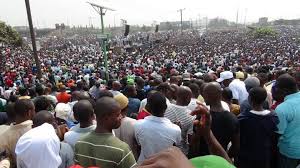
Nigeria’s freedom fighters in this cyber age have their eyes on the ball like never before. The human in their rights agitation is just getting in the way
Elijah Olusegun
With a Twitter-perfect hashtag and hearts brimming with angst, thousands of Nigerian youth massed out across the south and Abuja to protest police brutality October 8. The vim and Gen-Z flair they put into organizing the rally, especially the N147 million crowd-funding, stunned the older generation watching. As though it were out of this world. But it wasn’t.
The only strange thing was that the protest appeared to have run on autopilot. And that was because the youth that teed off the agitation only wanted to end the violent police squad—and have fun doing it. But the movement’s leaderlessness presented an opportunity for those on a solo mission against bad governance in Nigeria. And they snagged it. At least two veterans of civil disobedience pressed home the ENDSARS rudderlessness.
Omoyele Sowore and Aisha Yesufu are no spring chickens. At 49 and 46 respectively, the ex-presidential candidate and Sahara Reporters publisher, and the Bring Back Our Girls co-leader couldn’t contain their sugar rush when they saw those millennials spill out to the highways protesting. To the two older protesters, any protest, anytime, and anywhere, is okay for them and their self-appointed call to bring bad government to its knees—or shut it down altogether like the Arab Spring did. And it doesn’t matter whose administration it is. They both, in their different orbits in 2014, troubled the last PDP federal government. And in the ENDSARS protest that nearly wrecked President Muhammdu Buhari’s APC government—they stole the thunders.
Many Nigerians could see through the duo.
Keen observers have watched protests play out this way, time and again—from 2010 through 2012 and 2014 to 2019. The features hardly change: a breakout on social media, massive outing, sustained protests, all ending in chaos.
So the October 8 to 20 incident was just history repeating itself. The politics of it only made many Nigerians watching it gushy. And they missed the one pertinent point of it all: the motive powering protest movements in Nigeria usually drives the agitations off the rail, and pushes the protesters down a blind alley.
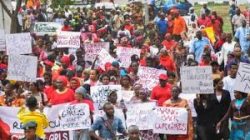
That was unmistakable in the heady days of the Save Nigeria Group, the Occupy Nigeria Movement, and the BBOG. As these protest movements either died or wore out, the new ones like Take it Back, Revolution Now, and ENDSARS sprang out, and picked up the thread.
In all, their struggles for good governance follow a similar arc: one or two heroes gutted with the status quo seek change on their own terms, stoke pent-up public anger against government by using social media. And the push eventually comes to a shove, mostly fatal, when the drive for change meets government opposition. There may be resolution after the crisis. There may be none. But, finally, comes falling action.
It came when the SNG, a group the radical Senior Pastor Tunde Bakare of the Latter Rain Assembly founded in 2010, heckled then Nigeria’s sickly President Umar Yar Adua. The president’s eventual death that year brought his V.P. Goodluck Jonathan to office.
For this, Bakare, a hit-and-run Lagos activist and one-parish pastor, got more eyeballs nationwide. He would later get on the same ticket with Muhammadu Buhari, then presidential candidate of the CPC, in the third unsuccessful run of the former military president.
Bakare worked his SNG again to spearhead then Nigeria’s history’s biggest protest. It was against Jonathan’s money-guzzling administration and subsidy removal policy that kicked in on January 2, 2012. The protest started at the Gani Fawehinmi Freedom Park in Ojota, Lagos, spread to Abuja and other states, then Washington, London, and Belgium, raging for two weeks, with the help of social media. The crowds were so big the rally quickly morphed into a local franchise of the more global Occupy Movement.
Debo Adeniran, the executive secretary of the Coalition Against Corrupt Leaders (CACOL) said the protest in itself was an eye opener. “Nigerians are capable of replicating Arab Spring and that the state should take necessary precautions not to arouse their anger to that level,” he said in hindsight.
Before it ended, no fewer than 17 people were shot dead by the police in Lagos, Kwara, and other states. Properties were torched in Minna, Niger. The government made excuse of national security to repress the protest. A documentary, Fuelling Poverty, released at that time by Ishaya Bako, was banned—because of its threat to national security.
And when it all died down, gainers emerged.
Peter Esele, president of the Trade Union Congress then, was among the arrowheads of the protest that eventually got a leg-up into the government—through the administration’s Subsidy Reinvestment Programme (SURE-P). He went into politics later. The SNG founder, too, got more entrenched in public consciousness, firing up his ambition to gun for Nigeria’s top job. Bakare has, since, been declaring presidential ambition every four years. He said God revealed to him in 2018 he’d replace Buhari.
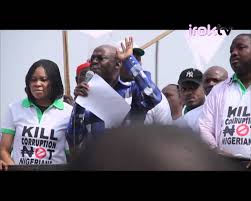
That will be a miracle—because, for now, the pastor has no party affiliation. His only platform SNG even died by the end of the life of the Jonathan administration. Then the BBOG sprang into life.
The group, a Twitter campaign in the wake of Boko Haram’s kidnap of 270 Chibok schoolgirls in 2014, went international. Under the leadership of ex-Minister Ezekwesili Obi, Hadiza Bala Usman, and Aisha Yesufu, the BBOG, with its blood-red paraphernalia, organized regular marches and sit-outs in Abuja, Kaduna, and other northern states. As always, counter-protests, violence, police brutality erupted, and a curfew came declared in Kaduna, among others. The group, however, carried on. And, ultimately, it became a nail in the coffin of Jonathan’s administration already despised as corrupt.
The movement’s success and popularity probably got into the heads of its leaders. Star worshippers were full of their praises for the group’s integrity: non-partisanship and rejection of western and local donors. Ezekwesili, a former topshot at the World Bank, particularly felt Nigerians needed a woman like her. Right on Twitter, days to registration deadline, she announced her intention to contest the 2019 presidency. No party. No structure. Stepping down from the BBOG leadership, she then flung herself into the race on ACPN’s ticket. It, however, ended in disappointment—a withdrawal-even after her name was already on the ballot by Feb 2019. But on the credit side, Ezekwesili is now on the list of the also-rans in Nigeria’s hall of presidential aspirants. Opportunities for keynote addresses on women and political empowerment flowed in, too, from all around Africa. Virtue is its own reward for the former Afrocrat.
Her colleagues reaped what they sowed, too, one way or the other. Hadiza Bala-Usman was jobbed into Buhari’s government in 2015, as head of the Nigeria Ports Authority. Yusuf was about the only one whose time hadn’t come fully then.
Some may dispute that, though. Those following the Twitter rage between her and Reno Omokri, former aide to Jonathan, may likely believe all of the BBOG battle axes that hewed down the Jonathan government got compensated, in cash or kind. Omokri and Yesufu have been spatting on Leah Sharibu, a Christian girl Boko Haram abducted under Buhari in 2016. The former media aide believes Yesufu and the BBOG aren’t doing as much for the girl as they did for the Chibok girls’ release. Yusuf also believes Omokri is making a kill from the sales of his book, T-shirts, and fundraisers for Sharibu.
“Where is humanity,” Yesufu asked Omokri in a tweet in August. In response to the rhetorical question, Omokri took the lid off the BBOG compensation cauldron—with an innuendo. “You and your fellow beggar with receipt have been used and dumped, Leave me alone,” he tweeted. “If you can’t help #FreeLeahSharibu, then don’t hurt it with lies. I am not like you guys begging @Elrufai at night!”
Others have argued Yusuf became a thorn in Buhari’s administration’s neck now because she is the only one left unrewarded for their role in smashing the PDP government.
Barbs apart, how much that reward or lack of it tampered down her commitment to BBOG, or aggravated her anger, is not clear. Yusuf wouldn’t respond to questions seeking clarifications on these issues. But, certainly, the load of demands (including education, health, security, welfare, corruption, and just anything worth criticizing) she and others set out to realize in 2014 are still as they were. No one is pressing for the demands again.
The point is: the BBOG lost steam. And an emerging movement, Sowore’s Revolution Now, eventually took the shine off it.
The hashtag-driven RevolutionNow campaign debuted with a lot of energy in Lagos, Osun, Cross Rivers, and other places in August 2019. The clampdown on the protests and detention of its founder and his Lieutenants Agba Jalingo and Olawale Bakare, 22, by the DSS boosted the street cred of the movement. It quickly overshadowed the moribund BBOG as the face of Nigeria’s protest movement. It boasted a bristling hordes of Johnys-on-the spot, wearing orange berets, ready to hit the street at Sowore’s call. The creation of the movement followed #Take it Back, another Twitter storm he triggered in the run-up to the 2019 presidential election he contested and lost. But that storm blew over quickly. Revolution Now apparently made up for all that. But not without scotching the BBOG. And the last of its women leaders standing has no platform and crowds vibrant enough for her one-woman mission.
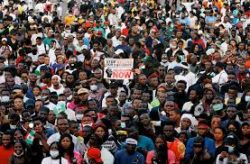
So it was irresistible when ENDSARS came, first as a Twitter campaign, then a rally, and, finally, an anti-police-brutality movement repurposed for fixing all things bad about Nigeria, in just two weeks. It was so big it engulfed other protest movements that attempted to make a joint venture of the rally on October 8.
The Sowore crowd came out, too, in solidarity. But the ENDSARS youth bounced them and their leader. “We don’t want you here. Sowore we don’t want you here,” the protesters shouted when Sowore tried to address them in front of the NASS complex in Abuja on October 15. As such, everyone interested in joining the protest had to come with no label. All they required was gut.
And Yesufu has plenty of it. Stripped of her BBOG color, she still managed to become the bellwether of some of the Abuja ENDSARS rallies. In her picture-perfect Abaya gown and hijab and a long-handled bag slung across her side, her left fist up in the air, Yusuf cut a figure of a female icon of civic rebellion. Sometime she took a knee (BLM-like) in front of a crowd also on their knees some distance behind her. Other times she had a low-level-camera-angle shot, giving her a striking pose that knocked many more of her fans dead. All of that resulted in a lot of media coverage, share-worthy-pictures, local and international—far more than she got during the BBOG days. According to TIME, Yesufu’s photos have been shared widely as a symbol of the protests.
Twitter founder Jack Dorsey was sold the icon, too.
“Dear @jack thanks for supporting our #EndSARS #EndSWAT plight. Have you met the stallion @AishaYesufu? We call her the Statue of Liberty,” Wizkid, one of Nigeria’s young music star, tweeted on October 14.
“On behalf her teeming fans. I request that you verify her account. Thanks in advance.”
She also had her free take on Buhari and VP Yemi Osinbajo when she clashed with the police. “It seems President Buhari @MBuhari & @ProfOsinbajo gave IGP order to shoot at protesters. #EndSars.”
Yesufu was rocking the frontline of the protest with the leaders and members of the Feminist Coalition, a women lib group whose support for LGBTQ may run afoul of Yusuf’s Islamic ideal, though she’s not a homo-shamer. But the comradeship the ENDSARS protests fostered benefitted all of them and Yesufu. In fact, it ushered in her own moment in the sun came.
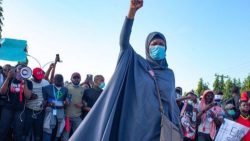
The solidarity rubbed off on Sowore, too. Despite the ENDSARS rejection of him and his Revolution Now intervention, the media activist crawled his way back somehow. Sahara Reporters reported the protest and Lekki shooting robustly. It’s covering the Justice Doris Obiokwu Judicial Panel in Lagos as thoroughly as possible.
While the nationwide melee that followed the October 20 to 23 breakdown of law and order calmed down, and the protesters were down in the mouth, Sowore hasn’t given up. He is still riding the wave of that public uproar. It really doesn’t matter the Revolution Now agitation is icing over. It’s all good as he and his right hand men in Osun have become the face of ENDSARS now.
As the protest died down, he organized a virtual town hall discussing what should follow the agitation the federal government put down. His man in Osun, Bakare, try to commandeer the movement, and weed out those who appeared resistant to the spirit of Sowore’s Revolution Now. Bakare, in a press statement published on Sahara Reporters, described those protesters as delusional for asking others to stop protest and dialogue with the state. Those rejecting the takeover equally released a statement, disclaiming Bakare and Sowore. “#EndSARS protest movement in Osun never endorsed Bakare and others as spokespersons,” the group counter-statement read. “We are of the robust conviction that these individuals are pursuing a very different agenda beyond #EndSARS and good governance.” They described the agenda as “holding the entire state into ransom for selfish reason of impressing their paid masters and allies in ‘Revolution Now Fraternity’”.
Still the Sowore flank isn’t relenting. They are trying to forge ENDSARS into a battering ram. The anti-police brutality movement now fights for a range of demands, including workers’ minimum wage in Osun. Other demands may be in the offing.
To turn a single-themed protest into a cure-all for all of Nigeria’s ills is, by any stretch of the imagination, a long shot. That was why the post-ENDSAR period began like most previous protests did—calming as post-mortem and blame game began. A class of the protesters—the hoodlums—are the spoilsports that derailed the protest, according to most of the pajamas supporters, for violence, as though violence had not always been part of the oxygen that fuels protests.
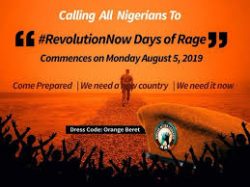
Whichever way, things, especially bad governance, haven’t ended the seismic way Yesufu, Sowore, Bakare, the feminist coalition had wanted. Police hasn’t become nice. But these movers and shakers of the space-age protest have had, at least, their sense of mission buoyed. They stand worlds apart from the mass of chicken-hearted Nigerians. And the heroics, highlighted in the well timed photos capturing all the psychological moments during the ENDSARS agitation, satisfy some personal needs—even if it’s cloaked in the sublime effort to save Nigeria. No happenstance.
And everything adds up—even in in the short run.
Trending

 Entertainment6 days ago
Entertainment6 days agoSimi addresses resurfaced 2012 tweets amid online backlash

 Health1 week ago
Health1 week agoSCFN, LUTH introduce bone marrow transplants as curative treatment for sickle cell

 Health4 days ago
Health4 days agoDeclassified CIA memo explored concealing mind-control drugs in vaccines

 Football1 week ago
Football1 week agoHarry Kane nets brace as Bayern edge Frankfurt 3–2 to go nine points clear

 Football1 week ago
Football1 week agoLate Flemming header stuns Chelsea as Burnley snatch 1–1 draw at Stamford Bridge

 Crime4 days ago
Crime4 days agoSenior police officers faces retirement after Disu’s appointment as acting IGP

 Education6 days ago
Education6 days agoPeter Obi urges JAMB to address registration challenges ahead of exams

 Crime1 week ago
Crime1 week agoTwo killed, seven injured in early-morning shooting in Richmond’s Shockoe Bottom

